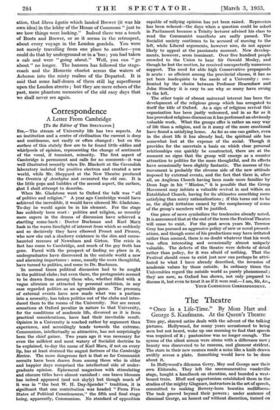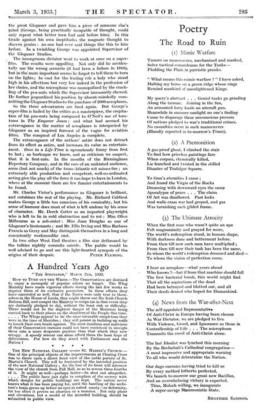The Theatre
"Once in a Life-Time." By Moss Hart and George S. Kaufmann. At the Queen's Theatre Tuts gay, shrewd satire deals with the advent of the talking pictures. Hollywood, for many years accustomed to being seen but not heard, woke up one morning to find that speech was required of it ; pantomime was no longer enough. The syrens of the silent screen were sirens with a difference now ; beauty was discovered to be raucous, and glamour strident. The stars in their new courses made a noise like a knife drawn swiftly across a plate. Something would have to be done about it.
In Hollywood's dilemma Gerry, May and George saw their own Eldorado. They left the unremunerative vaudeville stage, bought a handbook on elocution, and boarded a west- bound train. Bluff and opportunism established them in the studios of the mighty Glogauer, instructors in the art of speech, committed to making Bowery-born beauties mellifluous: The task proved beyond their powers ; under sentence of dismissal George, an honest oaf without discretion, turned on the great Glogauer and gave him a piece of someone else's mind (George, being practically incapable of thought, could only repeat what better men had said before him). In this tirade against his own ineptitudes the magnate thought to discern genius : no one had ever said things like this to him before. In a twinkling George was appointed Supervisor of the Glogaucr Studios.
The incongruous dictator went to work at once on a super- ' film. The results were appalling. Not only did he acciden- tally use 'the wrong scenario (it had been a failure in 1910), but in the*more impoitant scenes he forgot to tell them to turn On the lights ; he cast for the leading rile a lady who stood high in his affections but very low indeed in the profession of her choice, end the microphone was monopolized by the crack- ling of the pea-nuts which the Supervisor incessantly chewed. He further jeopardized his position by absent-mindedly cora- initting the Glogauer Studios to the purchase of 2000 aeroplanes. So the three adventurers are fired again. But George's super-film is hailed by the critics as a masterpiece, the crepita- tion of his pea-nuts being compared to O'Neil's use of tom- toms in The Emperor Jones ; and what had seemed his extravagance in the matter of aeroplanes is interpreted by Glogauer as an inspired forecast of the vogue for aviation films. The conquest of Los Angeles is complete.
The extravagance of the authors' satire does not detract from its effect as satire, and increases its value as entertain- ment. Once in a Life-Time is uproariously funny from first to last ; as burlesque we know, and as criticism we suspect, that it is first-rate. In the mouths of the Birmingham Repertory Company, and in the ears of an nnitiated audience, Some (but not much) of the trans-Atlantic wit misses fire ; an extremely able produetion and competent, well-co-ordinated acting give the play all the force it can hope to have in London, where at the moment there are few funnier entertainments to be found.
Mr. Charles Victor's performance as Glogauer is brilliant, and outshines the rest of the playing. Mr. Richard Caldicot makes George a little too conscious of his comicality, but his sense of humour does most of what is left undone by his sense of character. Mr. Derek Cotter as an imported playwright who is left to lie in cold obstruction and to rot : Miss Olive' Milbourne as a sob-sister : Miss Joan Douglas as one of Glogauer's lieutenants ; and Mr. Ellis Irving and Miss Barbara' Francis as Gerry and May distinguish themselves in a long and- consistently workmanlike cast.
In two other West End theatres a film star dethroned by the talkies nightly commits suicide. The public would be well advised to go and see this light-hearted synopsis of the



















































 Previous page
Previous page